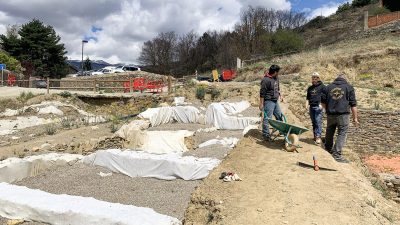
Last Tuesday, April 18, a new campaign of archaeological excavations began in the Roman forum Iulia Libica (Llívia, La Cerdanya).
The archaeological works in the Roman forum Iulia Libica are led by the Autonomous University of Barcelona (UAB) and the Catalan Institute of Classical Archaeology (ICAC).
The Diputació de Girona and the General Directorate of Cultural Heritage of the Generalitat de Catalunya collaborate on the project. The excavation works are led by archaeologists Cèsar Carreras, Òscar Trullàs, and Jordi Guàrdia. There is also the participation of Arqueòlegs.cat.
Leading director of the Iulia Libica research programme, Josep Guitart (former ICAC director and now associate researcher), and the director of the excavation works, Cèsar Carreras (UAB) made a visit to the site last Tuesday to organise the work to be carried out in the coming weeks.
The services and supplies that passed through the deposit (electricity, water, and gas) were already extracted at the end of last year –and channeled through a different area– which will allow excavation works to focus on the most central part of the archaeological site. At the end of this 2023 campaign, the space will have been fully discovered.
The City Council of Llívia, the Catalan Institute of Classical Archaeology, and the General Directorate of Cultural Heritage of the Generalitat de Catalunya signed last year the agreement for the next 4 years (2022-2025), a document that gives continuity to the excavation work of the Roman Forum Iulia Libica.
The commitment of the administrations –Generalitat de Catalunya, Diputación de Girona, City Council of Llívia, Autonomous University of Barcelona, and Catalan Institute of Classical Archaeology– has remained intact since this project began in 2013.
It should be pointed out that already in the first stage of annual archaeological campaigns evidence showed that ancient city of Llívia was a municipium, capital city of Ceratani people; and its religious, political, and administrative center are preserved.
The first stage of archaeological excavations in 2023 has begun, therefore, this April, and will end on May 31. The second phase of the archaeological campaign will take place in the months of August, September, and October. Students’ participation, this year, will be from August 27 to September 8.





